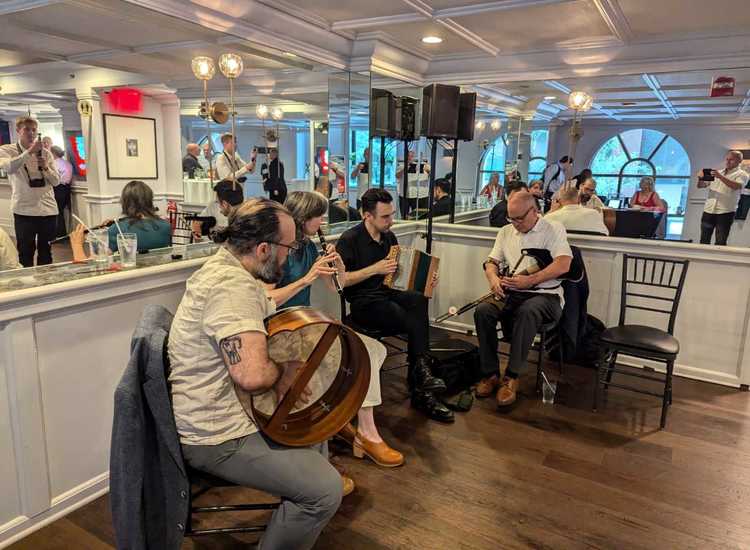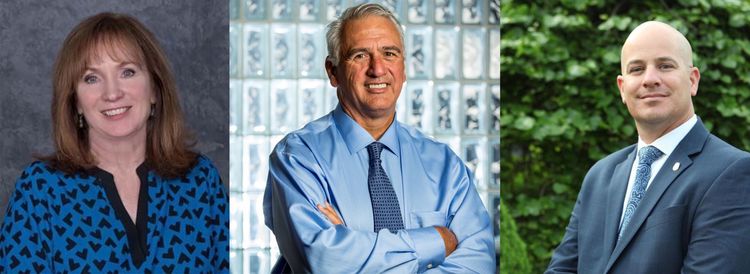Sean McNeill is into his third year as president of the Irish Business Organization of New York, Inc.
PHOTO: PETER MCDERMOTT
By Peter McDermott
It started at the bacon-slicer.
There, Sean McNeill learnt early that one-on-one communication is the key to success.
It might help explain the increased dynamism of the Irish Business Organization of New York under his presidency, with its program of four monthly meetings that are open to members and non-members alike.
Some Irish people know of the bacon-slicer as a cliché, a joke really, made popular by Frank Kelly, the Dublin actor who died on Feb. 28. In radio sketches decades ago, he seemed to suggest that watching it work in the general store was about as interesting as it got in a small village.
For McNeill, though, it was one prop that helped conversation in his family’s shop in the west of Ireland.
“I love meeting people,” he said. “Meet someone in person, say ‘hello’ to them -- they’ll remember you and you’ll remember them.
“When you meet people: listen to what they have to say, listen to what they do,” said the founder of the Manhattan-based McNeill Real Estate. “You need to have an interest in people. There’s no such thing as a quick deal.”
The family farm and shop weren’t the only McNeill enterprises. His mother ran the post office for more than 50 years through the 1990s and his grandmother was in charge before her. And you couldn’t get very far from the County Roscommon hamlet of Trien without the family’s help – they sold gas (or petrol, in local parlance).
The eight McNeill children – Sean was the 2nd born – were involved in the business empire.
“All sorts of child-labor laws were broken probably,” he said with a laugh.
McNeill believes he inherited, or perhaps acquired in the process, a “sales gene” that can’t be taught at Harvard Business School. New people skills and business knowledge were added during his teenage years with jobs at a bakery in nearby Castlerea and a hotel in Roscommon Town.
Move to New York
In the 1970s, after high-school graduation, he went to work with the Agricultural Credit Corporation in Dublin, where he spent much of his 15-year tenure there as a manager in the collections or “difficult cases” department. McNeill then had short-term jobs in rural Ireland, England, Germany, and the U.S. before returning to run a bar in Dublin. He finally settled in New York in 1993.
“I got involved in real estate by chance,” he recalled.
After working for two companies, McNeill set up his own in 2001. Soon afterwards, he joined the Irish Business Organization of New York for the first time (it’s usually referred to as the IBO). He dropped out for some years – a mistake, he feels now – before becoming active again in 2010.
Reelected for a third term at the end of 2015, his tenure has been associated with increasing trends towards greater inclusivity in the organization – a welcoming attitude to the LGBT community, for instance, and Irish Americans.
In the latter regard, the 1973-founded organization was for a long time seen primarily as a network for émigrés. Even into the 21st century some were describing it as an “Irish boys’ club,” the president has heard.
“I don’t remember that,” McNeill said. “But I might not have been so aware of it.”
Nowadays, however, half of the board members are American-born.
The McNeill presidency has also overseen a continued pivot toward business networking, which often means foregoing traditional ways of socializing.
“We do have coffee, tea, and sometimes, if it’s in a place that allows it, a glass of wine, but the emphasis is on networking,” McNeill said. “Afterwards, people will adjourn to a bar or restaurant that is owned by an IBO member.
“Being Irish, we’re very social anyway,” McNeill said. “But now it’s definitely more of a business organization than before.”
He pointed to the IBO’s tagline “Real Business Connections.” The president believes that the old one, “Network, Communicate and Reciprocate”, was quite strong, too, but its replacement is more obvious and to the point.
Sandra Sheerin has experience with groups with a similar mandate in Dublin, London and elsewhere and in comparison, she said, the IBO is rather more “committed and focused on quality business connections and deals.
Jim O’Sullivan, High Frequency Economics’ chief U.S. economist, pictured with Ireland’s Deputy Consul General Anna McGillicuddy at the IBO meeting at Glucksman Ireland House on Jan. 13. PHOTO: IBONEWYORK.ORG
“In recent years, I have seen the IBO go from strength to strength with its business networking events,” she added.
Sheerin, who founded the baked goods company Gaelic Girl Goodies, predicted that under “Sean McNeill’s direction and influence, the IBO will continue in its success as an organization that provides ample business opportunities to members and attendees.
“In doing so,” she said, “it has started to attract more younger business professionals who see the value and investment in these events.”
William Lee, a Manhattan-based financial advisor, is a young American-born professional who believes in the importance of such events.
“While social media is important, at the end of the day there’s no substitute for meeting people in person. It creates a level of trust,” said Lee, who recently completed a term as an IBO vice-president.
Mentored in the art of networking himself when he joined the IBO, he has since helped train others in New York’s ways.
“My brother-in-law from Texas experienced a culture shock when he came here,” said Lee, a native Long Islander.
“But to be successful you have to compete with thousands of people in New York,” he said.
Sandra Sheerin, founder of baked goods company Gaelic Girl Goodies, says the IBO is more focused on business than its equivalents in other cities worldwide. PHOTO: PETER MCDERMOTT
“Competitors can become allies,” said Jim Faulkner, of Flynn & Faulkner Insurance Agency in Long Valley, N.J. Through networking, he has become aware of other people’s niche specialties, and that has been a boon, for example, in the insurance world created by the Affordable Care Act, where referrals are important for business.
The four meetings
“It’s worked for me.” Faulkner said generally of the organization. “I’ve gotten a number of new clients in the IBO.
“And if you want an introduction to someone in particular, Sean is very good at organizing that and connecting you,” he added.
Lots of introducing and connecting happens at the four scheduled monthly meetings, as well as other special events.
The under-40s meeting on the first Thursday of the month has been a “huge success,” said the president. It has a more relaxed attitude on alcohol, as it’s billed as “IBO Young Professionals -- Cocktail Hour.”
“Our regular breakfast meeting usually attracts 30 or 40 people at 8 a.m. on the third Tuesday of the month,” McNeill said. “There’s great energy to it.”
Although plenty of networking goes on at the breakfast event often held at the Fitzpatrick Manhattan Hotel, 687 Lexington Ave., the speaker tends not to be confined to a narrowly business theme. April’s guest for example, Fordham Professor Mark D. Naison, will talk about the history of Irish-American labor.
“Minding Your Business,” a seminar held on the last Saturday morning of the month, can attract similar numbers to the Tuesday breakfast. McNeill remembered that Kevin Ryan of Linkedin has given two presentations on how best to optimize use of the networking site, while Andrew Mellen, the “most organized man in America,” has offered his tips on dealing with clutter.
The IBO’s main meeting takes place on the second Wednesday of the month and usually features a high-profile speaker from the business world. In January, the Deputy Consul General of Ireland Anna McGillicuddy helped introduce the new IBO board to the more than 100 people gathered at Glucksman Ireland House, NYU, after which Jim O’Sullivan, the chief U.S. economist of High Frequency Economics, gave a presentation. O’Sullivan, who has been named for five consecutive years by MarketWatch as the “best economic forecaster in America,” then took questions from the floor.
“A good speaker is someone who is successful, who is engaging, who is interested in the Irish community,” McNeill said.
The president cited two from his native Roscommon: Adrian Jones, a managing director at Goldman Sachs, and motivational speaker Kevin Kelly.
“The return on being a member is linked to the number of meetings you go to,” McNeill said. “The more you go to meetings the more people get to know you.”
“You have to be seen to make an effort,” said Faulkner, who emigrated with his family from Donegal to the U.S. in the post-war era.
McNeill, of course, doesn’t believe that networking should be confined to meetings.
He once went into the wrong computer store and had a conversation there that resulted in his securing an African mission to New York as a client. That in turn led to other referrals. On another occasion, a client asked advice on behalf of her journalist friend who was relocating to a job in New York. He organized it and later on other relocations for colleagues in her high-profile media company.
From left, Paul Tuffy, IBO treasurer, Bernadette Conaty, 2nd vice president, Nick Malito, 1st vice president, Mary Zehnter, membership officer, and Anne Marie O’Dea, secretary, at the St. Patrick’s Day party hosted by the IBO at the Metropolitan Republican Club last Thursday evening. PHOTO BY PETER MCDERMOTT
Additionally, working alongside fellow members on an event like the IBO’s Golf Classic in May, which raises money for charity, can be the right thing to do as well as being good for business, in the president’s view.
“We do a lot of outreach. We do a lot of good work. We help a lot of people. It adds up together and as a result of there might be a nice payback on it,” he said.
“Someday, somebody will buy something from you or sell something you’re in. Whatever business you’re in. It doesn’t matter,” McNeill said. “So my philosophy is just be part of the community, be there, be a decent guy.”
This article was written as part of the Business Reporting Fellowship of the Center for Community and Ethnic Media and funded by a grant from News Corp.
[CLICK ON IMAGES FOR LARGER PICTURE]












